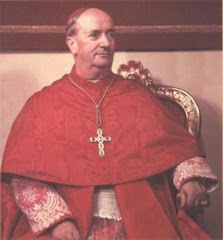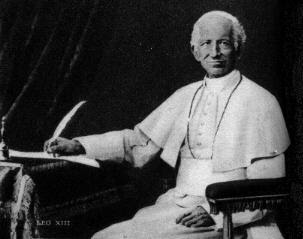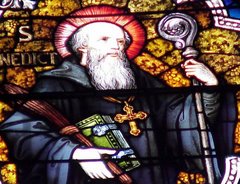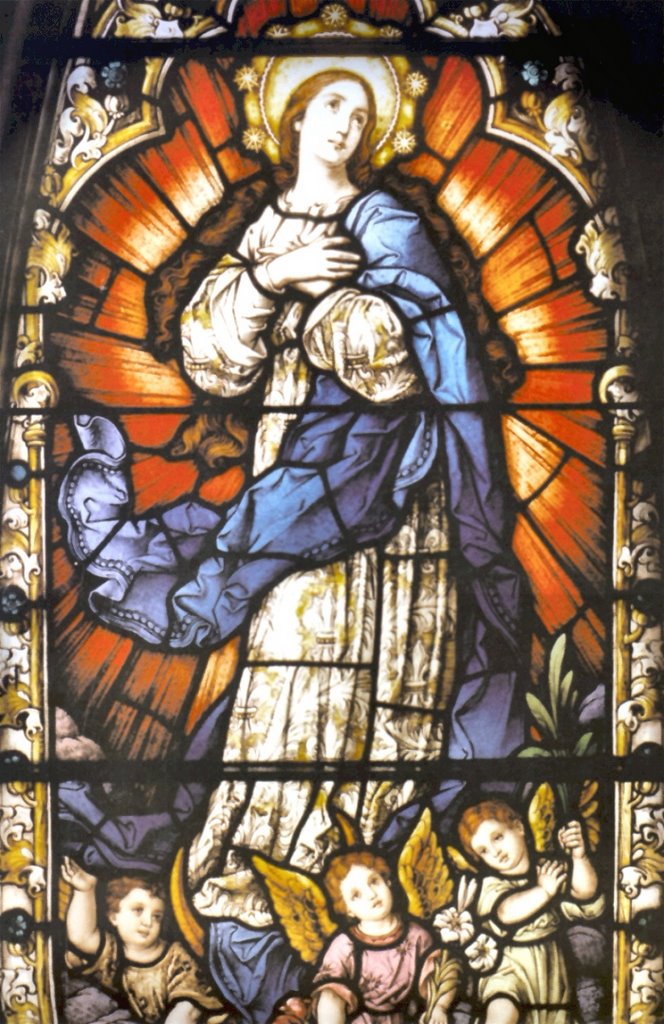Sunday, January 23, 2011
The Catholic Blogosphere
One Catholic blogger has drafted an interesting piece on what he calls "The Vocation of the Catholic Blogger", which I have found to be quite interesting, and worthy of note. Therefore, I would like to encourage our audience to peruse this post for its interesting perspective on publishing opinions via the internet, especially by Catholic bloggers, namely traditionalists.
Tuesday, November 10, 2009
On Limbo
The following excerpt is offered to further elaborate the classic doctrine of a third state, whence a soul may find itself, contingent on the circumstances of life, when the state of heaven nor hell can not have been justly deserved, for souls that may not have been capable of meriting either of the former, namely unbatized infants who pass on prior to the age of reason. It does not serve to advance a comprehensive treatment of the subject, however, I believe that it is a good read.
- Excerpt from "Limbo: or, An apology for purgatory and prayers for the dead; being the sequel to "the state of the blessed dead" by John Stewart M'Corry, D.D.
"To demonstrate what is here advanced, let us, first of all, scan the pages of the Old Testament. We shall there find abundant evidence corroborative of our position, which necessarily presupposes the belief of a middle state. For, be it observed, and let it be constantly borne in mind, that during the period of the old law, none ascended into heaven, 'the way of the holies,' as the Apostle says, ' being not yet made open.' Christ Himself was to dedicate that new and living way,' and begin the entrance in His own person, and by His passion and death to unlock the gates which had been closed against Adam, and all his posterity : ' He alone was found worthy to open the seals and to read the book.' Hence the language used in the Old Testament with regard to even the best of men is, that dying, they went down ad inferos, or ad infernum the lower hell so that they descended not to the grave, which received only their bodies, but ad inferos, ' into hell' the common receptacle for their souls. As exemplifying our meaning, let us bring a few instances in point.
We read, in the book of Genesis, that Jacob, while lamenting the loss of his son Joseph, whom he thought a wild beast had devoured, cried out in the bitterness of his grief, ' I will go down to my son into hell mourning.' The royal Psalmist also makes continual allusion to such a belief. In one of his Canticles he declares, ' Thou wilt not leave my soul in hell ;' and in another he exclaims, ' Thou hast delivered, Lord, my soul from the lower hell;' and again, he asks, ' Shall he deliver his soul from the hand of hell ?' Now, that the hell mentioned here cannot be the abode of Satan and the wicked spirits, is indubitably certain ; since it is incredible that Jacob could have supposed that the soul of his young almost infant son, Joseph, had been consigned to that dungeon. And David would neither have said, ' Thou wilt not leave my soul in hell,' had it been the hell of the damned ; since out of that dreadful region there is no coming forth ; nor would he have spoken of his soul's deliverance from the ( lower hell,' unless he believed that there was a ' lowest hell.
St. Jerome, speaking of the Patriarchs and Prophets, says, If Abraham, Isaac, and Jacob were in hell, who were in the kingdom of heaven ?' Again, he writes, ' Before the coming of Christ, Abraham was in hell ; after His coming, the thief was in Paradise. ' Lest it, then, might be urged that Lazarus, being in Abraham's bosom, beheld the rich glutton afar off in hell, and that therefore both Abraham and Lazarus seem to have been in heaven, the same holy Doctor dilutes entirely the difficulty by observing, that these also were in hell, but in a place of rest and refreshment ; and therefore at an immense distance from the wretched glutton who lay in torments in the lowest hell the hell of the damned....
Moreover, there is a passage in the Book of Ecclesiasticus which seems to harmonise with our ideas of a middle state. In chap. vii. v. 37, we read, ' And restrain not thy favour from the dead.' Now, we may be permitted to ask, what favour is this, which can be conferred upon the dead? It is to no purpose, in good sooth, to praise them it is no favour to erect a monument to eternise their memory, since they receive no possible advantage the only favour is the suffrages which the living offer up in their behalf. The learned commentator, Estius, in his Scriptural Annotations, explains the citation in this sense, and gives it as a probable opinion that Ecclesiasticus recommended prayers and oblations for the dead a practice very prevalent among the Jews, in opposition to the heresy of the Sadducees, who denied the resurrection. It would appear that Ecclesiasticus was contemporary with the Maccabees, and the writings of the latter serve to throw an additional light upon the passage in question, thereby corroborating this interpretation. Now, no argument could possibly be more luminous, or cogent, in attesting the Catholic dogma of a middle state, than what is derived from the second book of the Maccabees. We there read that the valiant Judas Maccabeus, 'making a gathering, fice to be offered for the sins of the dead, thinking well and religiously concerning the resurrection It is therefore a holy and wholesome thought to pray for the dead, that they may he loosed from their sins.' Here is an unquestionable proof of the practice of praying for the dead, under the old law, by God's chosen people. From this extract, we have the most minute and circumstantial evidence that the custom of praying for the dead obtained among the Jews for more than a century and a half anterior to the coming of our blessed Saviour ; that such a custom was not confined to any particular sect, but was practised by the whole Jewish nation, being observed by the people as well as by the priesthood
an especial sacrifice being appointed for that purpose to be offered up in the temple of Jerusalem ; and, finally, that this sacrifice, and these supplications, were expiatory, since the end for which they were instituted was, that the dead might be loosed from their sins. The Jews therefore believed, as is obvious from their practice, that the dead could be succoured by the prayers of the living, and, to use their own language, 'be loosed from their sins.'
- Excerpt from "Limbo: or, An apology for purgatory and prayers for the dead; being the sequel to "the state of the blessed dead" by John Stewart M'Corry, D.D.
Monday, March 2, 2009
Bp. Williamson Controversy

At about the same time the excommunications were lifted from the SSPX, an interview initially recorded several months prior broke onto the scene, sending shockwaves throughout the Catholic community. Included in this interview was a piece concerning the Bishop's views on the holocaust, which section can be viewed at this link [1]. The Vatican was quick to denounce this burst of perceived antisemitism when Cardinal Kasper, the liaison for Vatican-Jewish relations, said in an interview with Italian daily La Repubblica, concerning Bp. Williamson's opinions "These are unacceptable words. To deny the Holocaust is stupid and is a position that has nothing to do with the Catholic Church." The bishop is informed that he is not to function as a cleric of the Church until he recants his statements[2] British bishops were no more sluggish than the Vatican when a spokesman for the bishops said “The views of one of the bishops of SSPX in denying the reality of the Holocaust are totally unacceptable.”[3] Meanwhile, on behalf of U.S. Bishops, Cardinal Francis George condemned the words of the bishop with these comments “Bishop Williamson has denied historical facts about the Shoah, in which six million Jews were cruelly annihilated, innocent victims of blind racial and religious hatred. These comments have evoked understandable outrage from within the Jewish community and also from among our own Catholic people. No Catholic, whether lay person, priest or bishop can ever negate the memory of the Shoah, just as no Catholic should ever tolerate expressions of anti-Semitism and religious bigotry...”[4] The Society of St. Pius X wasted no time in distancing itself from Bp. Williamson in a statement issued by the Superior General "Bishop Williamson’s statements do not in any way reflect the position of our Society."[5] Superior General of the SSPX, Bp. Bernard Fellay is reported to have ordered Williamson to correct his statement, saying "As soon as I saw this interview I told him to correct this nonsense... The sooner, the better," and said the Society didn't understand how the bishop could have been so mistaken.[6] Less than a week later, Bp. Williamson accepted Fellay's decision to relieve him of his post as rector of La Reja Seminary in Argentina.[7] According to the head of the Argentinian organization "National Institute Against Discrimination (INADI)", Maria Jose Lubertino, Williamson could potentially face legal charges in Argentina, and a prison sentence of up to three years.[8] In Europe, the French organization "International League Against Racism and Anti-Semitism" publishes threats of pressing charges against the bishop for "contesting crimes against humanity". [9] In Germany, where denial of the holocaust is a crime, punishable with up to 5 years imprisonment, a German district attorney has instigated a criminal investigation against Bp. Williamson. Regensburg District Attorney Guenther Ruckdaeschel said authorities are investigating whether his remarks can be considered to be "inciting racial hatred."[10] Amidst concerns of being extradited to Germany and tried in criminal courts upon returning to the EU, Bp. Williamson was received into England on the 24th of Feb, now residing in London.
Endnotes:
[1] Inclusion of this link does not imply endorsement by VITW or its authors.
[2] adnkronosinternational, "Vatican: Cardinal slams bishop for Holocaust denial", Jan. 26, 2009
[3] Times Online, "Britain's Catholic bishops denounce anti-Semitism", Jan. 27,2009
[4] Catholic News Agency, "U.S. Catholic bishops condemn comments by SSPX bishop", Feb. 3, 2009
[5] Superior General Bernard Fellay, General Statement, Jan. 27, 2009
[6] Spiegel Online, "Head of SSPX Calls on Williamson to Correct 'Nonsense'", Feb. 10, 2009
[7] Rorate Caeli, "Confirmed: Williamson Removed", Feb. 9, 2009
[8] Deutsche Welle News, "Holocaust Revisionist Put Under Pressure by Church, Courts", Feb. 17, 2009
[9] JTA, "French Group will charge bishop", Feb. 11, 2009
[10] CNN News, "Holocaust-denying bishop loses court battle"
Thursday, February 12, 2009
Vatican Removes Excommunication on Society of St. Pius X
On January 24th of this year it was reported that the sentence of excommunication imposed upon the Society of St. Pius X in July of 1988 was "lifted". An English translation of the decree was published by Rorate Caeli as follows:
Decree of the Congregation for Bishops
CONGREGATIO PRO EPISCOPIS
By way of a letter of December 15, 2008 addressed to His Eminence Cardinal Dario Castrillón Hoyos, President of the Pontifical Commission Ecclesia Dei, Mons. Bernard Fellay, also in the name of the other three Bishops consecrated on June 30, 1988, requested anew the removal of the latae sententiae excommunication formally declared with the Decree of the Prefect of this Congregation on July 1, 1988. In the aforementioned letter, Mons. Fellay affirms, among other things: "We are always firmly determined in our will to remain Catholic and to place all our efforts at the service of the Church of Our Lord Jesus Christ, which is the Roman Catholic Church. We accept its teachings with filial disposition. We believe firmly in the Primacy of Peter and in its prerogatives, and for this the current situation makes us suffer so much."
His Holiness Benedict XVI - paternally sensitive to the spiritual unease manifested by the interested party due to the sanction of excommunication and trusting in the effort expressed by them in the aforementioned letter of not sparing any effort to deepen the necessary discussions with the Authority of the Holy See in the still open matters, so as to achieve shortly a full and satisfactory solution of the problem posed in the origin - decided to reconsider the canonical situation of Bishops Bernard Fellay, Bernard Tissier de Mallerais, Richard Williamson, and Alfonso de Galarreta, arisen with their episcopal consecration.
With this act, it is desired to consolidate the reciprocal relations of confidence and to intensify and grant stability to the relationship of the Fraternity of Saint Pius X with this Apostolic See. This gift of peace, at the end of the Christmas celebrations, is also intended to be a sign to promote unity in the charity of the universal Church and to try to vanquish the scandal of division.
It is hoped that this step be followed by the prompt accomplishment of full communion with the Church of the entire Fraternity of Saint Pius X, thus testifying true fidelity and true recognition of the Magisterium and of the authority of the Pope with the proof of visible unity.
Based on the faculties expressly granted to me by the Holy Father Benedict XVI, in virtue of the present Decree, I remit from Bishops Bernard Fellay, Bernard Tissier de Mallerais, Richard Williamson, and Alfonso de Galarreta the censure of latae sententiae excommunication declared by this Congregation on July 1, 1988, while I declare deprived of any juridical effect, from the present date, the Decree emanated at that time.Rome, from the Congregation for Bishops, January 21, 2009.Card. Giovanni Battista Re
Prefect of the Congregation for Bishops
Friday, September 12, 2008
VITW Bulletin
Notice:
For our regular readers: We apologize for the lack of material produced in the last few months [again] and regret to announce that the hiatus may last just a little bit longer. A lot has happened in the last few months apart from the internet and so it currently continues, and, as the majority of posts are composed by myself, I am become recently booked with lots of work which keeps me off of the internet much of the time, and therefore, postings have become much more infrequent, and therefore, at least for the present time, the posting schedule here at VITW is suspended, but there is hope that posts will resume soon with the continuation of commentaries on relations between the NO and tradition, particularly between apologists and spokespersons, namely concerning Mr. Shea's recent article on the topic.
For our newer readers: there is an archive of several dozen posts that will hopefully suffice for the duration of the hiatus.
And now, the News:
Original posts of a theological or philosophical nature are being suspended, at least as far as we can tell, indefinitely, however, posts of a cyclopedic, speculatory, or reportial nature will resume as ordinary upon the lifting of the hiatus.
However, you can still visit some of our friends, contributors or colleagues listed in our links lists.
Thanks to all and God Bless.
For our regular readers: We apologize for the lack of material produced in the last few months [again] and regret to announce that the hiatus may last just a little bit longer. A lot has happened in the last few months apart from the internet and so it currently continues, and, as the majority of posts are composed by myself, I am become recently booked with lots of work which keeps me off of the internet much of the time, and therefore, postings have become much more infrequent, and therefore, at least for the present time, the posting schedule here at VITW is suspended, but there is hope that posts will resume soon with the continuation of commentaries on relations between the NO and tradition, particularly between apologists and spokespersons, namely concerning Mr. Shea's recent article on the topic.
For our newer readers: there is an archive of several dozen posts that will hopefully suffice for the duration of the hiatus.
And now, the News:
Original posts of a theological or philosophical nature are being suspended, at least as far as we can tell, indefinitely, however, posts of a cyclopedic, speculatory, or reportial nature will resume as ordinary upon the lifting of the hiatus.
However, you can still visit some of our friends, contributors or colleagues listed in our links lists.
Thanks to all and God Bless.
Thursday, September 11, 2008
Rev. Haydock on the Language of the Liturgy
"Did the word of God first come out from you? This he says, to check these new preachers, by putting them in mind, that they are not the first, nor the only Christians, and so must conform themselves to the discipline practised in other Churches, especially since, as their apostle, he hath delivered them the commandments of the Lord. And if any man know not, will not acknowledge, and follow these rules, he shall not be known; God will not know, nor approve his ways. The pretended reformers, from the expressions with which the apostle blames the abuse some new converts made of the gift of tongues, think they have found a plausible argument to reprehend Catholic, for using the same Latin tongue in the Mass, and in the public liturgy. They consider not, whether they have the same reasons to find fault with the present discipline of the Church, as St. Paul then had to blame the Corinthians: whether the circumstances be the same or different: they think it enough that Latin, which is used in the Mass, is a language not understood by a great many ignorant people, and therefore they can say with St. Paul, that an idiot, or an unlearned man, knows not when to say Amen to what he hears. Two things offer themselves here to the consideration of every man, who is disposed to judge impartially. 1. Whether the same reasons and motives now subsist for blaming the Catholics. 2ndly, whether the conveniences and inconveniences, duly examined, it be found more commendable to perform the public liturgy, in those, which are the most general languages, as in Latin or Greek, or to have all liturgies turned into as many tongues, as the ignorant people understand and speak in different places. As to the first, St. Paul does not absolutely forbid the use of this gift of tongues, that were not understood, even by any one (as hath been already observed). All that he blames is, that many, who valued themselves on this gift, spoke at the same time altogether strange tongues, which none understood, but those who had another gift of the Spirit, called the interpretation of speeches, on which account in these meetings there was nothing but confusion, without any profit, edification, or instruction, at a time, and in such circumstances, when instructions were absolutely necessary, both for the new converted Christians, and also for the infidels, who flocked thither as much as the Christians. The case is now quite different, when none but Catholics meet, (especially at the Mass) who have been instructed from their infancy, what they are to believe, as to the mysteries of faith, and what they ought to practise, as to the commandments, the sacraments, prayer, and other points, which they have in their catechisms, or which have been delivered to them by catechetical discourses and instructions. And if they have been happily converted, or are upon their conversion, they are always carefully instructed in the tongue which they understand, as to what they ought to believe, and in the duties of a Christian life. Besides this, all present are frequently instructed by sermons and exhortations, not only on Sundays and holidays, but daily in Advent and Lent, as it is the custom in Catholic countries. I know some of our adversaries have been persuaded, that we preach in Latin to the people; to be convinced of the contrary, let them come and hear us; it is the worst I wish them. As to the sacrifice of the Mass, which none but they who are priests, can offer for the people, of which also a great part, according to the institution of the Church, as the Council of Trent observes, (session 22. cap. 5.) is said with a low voice: it is not performed in Latin in the Western Church, or in Greek in the East, that the meaning of the words may be concealed, since the same Council has laid an express injunction upon all pastors, and upon all that have care of souls, that they frequently, and especially on Sundays, and holidays, expound to the people, what is contained in the Mass, to wit, the parts, and the ceremonies. See 22nd session, cap. 8.) And this command is again repeated, (session 24. cap. 7.) that they instruct the people in their mother tongue concerning the divine mysteries and sacraments. All that can read, may find the Mass translated into their own language, and the most ignorant are taught and instructed, that by the different parts are represented the death and sufferings of our Saviour, Christ: they are taught how to offer up at the same time their intention, their heart, and their prayers: to confess themselves sinners before God, as the priest does, how they ought to endeavour to praise, and adore Christ with the blessed spirits in heaven; how they ought to beg graces of God, by saying the Lord's prayer; how they ought, at the same time, at least in spirit and desire, to receive the holy sacrament of the eucharist, with a sincere repentance, with humility and devotion. Cannot all things, then, be done to edification, as St. Paul requires, though the words of the Mass, and public liturgy, be in a language which the ignorant do not understand, but which, of all others, is the most general! Now the second thing to be examined is, whether, all things duly considered, it be better to retain the public Church-offices in Latin, and in those ancient dead languages, as they are called, or to turn the liturgy into as many tongues, as are spoken in different places and countries! Our adversaries, by this new alteration which they have made, have gone against the judgment of all Christian Churches, both in the West and East, and in all parts of the world. For as Mons. Simon takes notice, in his Critics, all other Churches (the Protestant only excepted) have judged it expedient, to stick to the words and languages of their ancient liturgies, the Grecians to the ancient Greek, which now the ignorant among them do not understand; the like is to be said of the ancient Syriac, Arabic, Coptic, &c. And it is also observed, that the Israelites continued the reading of the law and the prophets, in the ancient Hebrew, which the common people of the Jews did not understand after their return from the Babylonian captivity. It is well known that Latin in this part of the world, is more generally spread and known, than any other language whatsoever. It is taught every where in all public schools. It is learnt, not only by the ministers of the Church, but by almost all gentlemen, and by persons of all conditions, the poorer sort only excepted. There is this great convenience, that the same priest can perform all the public Church-offices, in all places and kingdoms where he travels. All the faithful, whithersoever they have occasion to go, meet with the same Mass, and liturgy in the same words abroad, which they were accustomed to hear at home. The same uniformity is every where preserved without change or confusion. But according to the method introduced by the Protestants, the liturgy must be changed into as many different tongues, as there are countries and places, and in almost every century, as we see by experience, languages are liable and subject to considerable changes and alterations. From hence arises a danger of changes, as to the doctrine and belief of the faithful: errors and heresies are the consequences, that follow such frequent changes, especially, when by another false principle of the said reformers, every private man and woman has a right to expound the hard and obscure place of the holy Scriptures, which make up the chief and greatest part of all public liturgies in all Christian Churches. I might ask of the Protestants, whether the ignorant people at lest, and idiots, as St. Paul calls them, understand the meaning of the Psalms, when they are sung in Hopkins's rhymes; though they may perhaps know when to say Amen, with the rest. Nor yet does every ignorant man know what the word itself, Amen, signifies, and therefore knows not what he answers. I cannot but here take notice of an unfair way of proceeding, even in the best Protestant translation, by sometimes adding in this chapter the word unknown, and sometimes omitting it. All Catholics are willing to allow, that by the gift of speaking tongues, St. Paul means tongues unknown, though the word unknown is not found so much as once, neither in the Latin, nor even so much as in any one Greek manuscript. The Protestant translators, for tongues, have put unknown tongues, in all the verses, where St. Paul blames the abuse of this gift; to wit, ver. 2. 4. 13. 14. 19. 27. but they make no such addition, where St. Paul either commends, or permits the speaking in tongues not understood, as ver. 5. where he says, I would have you to speak tongues; and ver. 29. where he says, forbid not to speak tongues. It is evident, that there is the very same reason for the addition, or the omission equally in all these verses. Is this to translate faithfully? I would by no means judge rashly, even of any adversary; but it looks as if both the addition and omission was with a design of making this popular objection seem to be of greater force against this point of discipline, and practice of the Catholics, and indeed of all Christian Churches." (Witham)
- Haydock Bible Commentary on I Cor. Ch. XIV, Ver. 36-38.
Friday, June 27, 2008
Old Fashioned Ecumenism: St. Francis Xavier
St. Francis Xavier: “...God, most Faithful and True, held the misbelievers and their prayers in abomination, and so willed that their worship, which He rejected altogether, should come to naught.”[1]
“When all are baptized I order the temples of their false gods to be destroyed and all the idols to be broken in pieces. I can give you no idea of the joy I feel in seeing this done, witnessing the destruction of the idols by the people who lately adored them…When I have done all this in one place, I pass to another… In this way I go all around the country, bringing the natives into the fold of Jesus Christ, and the joy I feel in this is far too great to be expressed…”[2]
“For my part, it does not astonish me that the bonzes [the false, pagan religious leaders in Japan] are covered with so many and so great sins. They are a set of men who have the Devil in place of God, and it is a matter of necessity that they should commit crimes innumerable and abominable… I earnestly beg all who read this letter of mine… to pray that Our Lord Jesus Christ will give us the victory over these two demons Xaca and Amida [the false gods of the Japanese], and over the others like them, especially since at present their credit is waxing weak at Amanguchi, not without the special providence of God.” [3]
“These children [converted to Christ]… show an ardent love for the Divine law, and an extraordinary zeal for our holy religion and imparting it to others. Their hatred for idolatry is marvelous. They get into feuds with the heathens about it… The children run at the idols, upset them, dash them down, break them to pieces, spit on them, trample on them, kick them about, and in short heap on them every possible outrage.”[4]
___________
Endnotes:
[1] St. Francis Xavier, Sept. 18, 1542; Colridge, Life and Letters, Vol. 1, p. 116)
[2] St. Francis Xavier, +1545; Colridge, Life and Letters
[3] St. Francis Xavier, Jan. 29, 1552; Ibid.
[4] [St. Francis Xavier, +1543; Ibid.
“When all are baptized I order the temples of their false gods to be destroyed and all the idols to be broken in pieces. I can give you no idea of the joy I feel in seeing this done, witnessing the destruction of the idols by the people who lately adored them…When I have done all this in one place, I pass to another… In this way I go all around the country, bringing the natives into the fold of Jesus Christ, and the joy I feel in this is far too great to be expressed…”[2]
“For my part, it does not astonish me that the bonzes [the false, pagan religious leaders in Japan] are covered with so many and so great sins. They are a set of men who have the Devil in place of God, and it is a matter of necessity that they should commit crimes innumerable and abominable… I earnestly beg all who read this letter of mine… to pray that Our Lord Jesus Christ will give us the victory over these two demons Xaca and Amida [the false gods of the Japanese], and over the others like them, especially since at present their credit is waxing weak at Amanguchi, not without the special providence of God.” [3]
“These children [converted to Christ]… show an ardent love for the Divine law, and an extraordinary zeal for our holy religion and imparting it to others. Their hatred for idolatry is marvelous. They get into feuds with the heathens about it… The children run at the idols, upset them, dash them down, break them to pieces, spit on them, trample on them, kick them about, and in short heap on them every possible outrage.”[4]
___________
Endnotes:
[1] St. Francis Xavier, Sept. 18, 1542; Colridge, Life and Letters, Vol. 1, p. 116)
[2] St. Francis Xavier, +1545; Colridge, Life and Letters
[3] St. Francis Xavier, Jan. 29, 1552; Ibid.
[4] [St. Francis Xavier, +1543; Ibid.
Subscribe to:
Posts (Atom)















